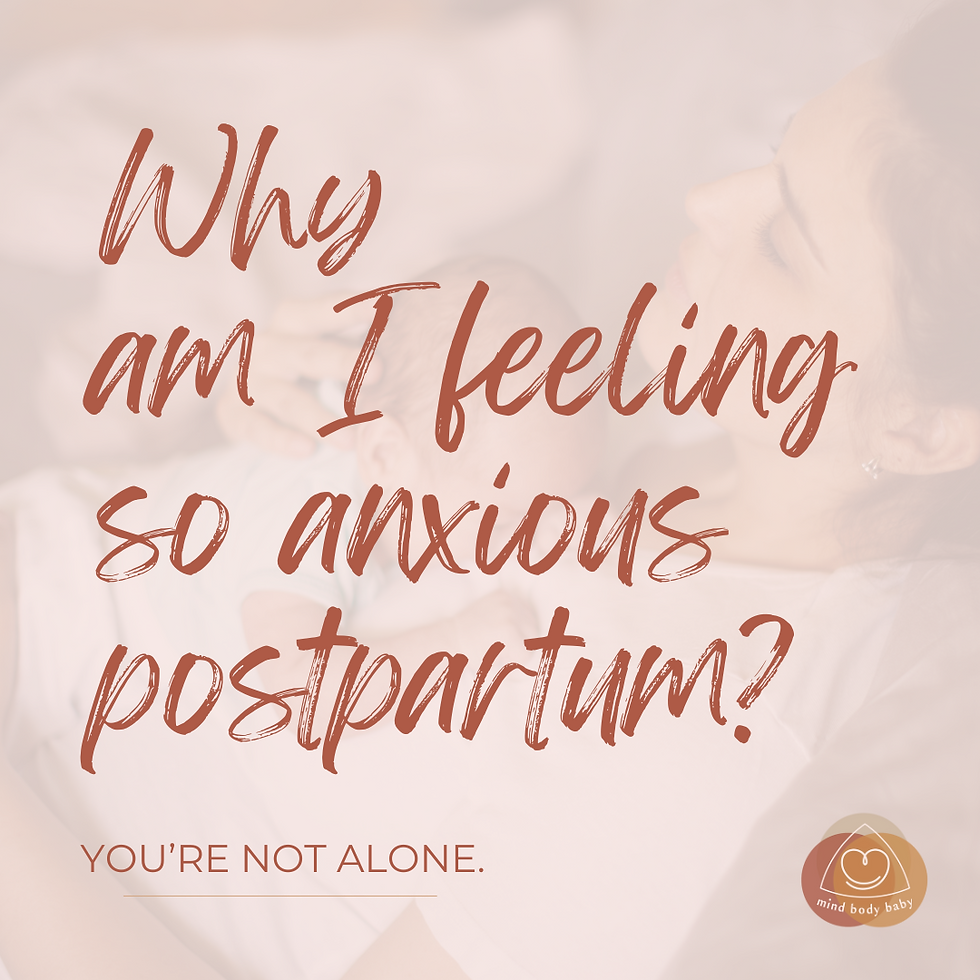Coping Strategies for Postpartum Mental Health
- MBB
- May 1, 2024
- 4 min read
Updated: May 21, 2024

From the euphoria of cuddling your newborn to the exhaustion of sleepless nights, the postpartum period is a whirlwind of emotions. With all of the diaper changes and constant feeding demands, one crucial aspect often overlooked is your mental health. This blog dives deep into common challenges like postpartum depression (PPD), anxiety (PPA), and rage. We'll explore what they are, the signs to watch for, and the importance of seeking help. We'll also discuss coping strategies, building a solid support network, and navigating the hormonal changes that can impact your mood after birth. Remember, mama, prioritizing your well-being is vital to thriving in this new chapter of parenthood!
Understanding Postpartum Mood and Anxiety Disorders
Postpartum Depression (PPD): Affecting up to 1 in 5 women, PPD is more than just the "baby blues." It may feel like extreme sadness, anxiety, exhaustion, and difficulty bonding with your baby. Some signs may be changes in sleep or appetite, difficulty concentrating, and a loss of interest in activities that you used to enjoy. Risk factors include a history of mental health issues, a lack of support networks, and stressful life events. Remember, PPD isn't your fault, and it's absolutely treatable.
Postpartum Anxiety (PPA): Less commonly discussed, PPA can manifest in a few ways, from intrusive thoughts to full-on rage episodes. Feeling overwhelmed or constantly worried about your baby's health are normal concerns, but excessive, persistent anxiety that disrupts daily life can be a red flag. Watch out for emotional signs like feeling too overwhelmed, irritable, or having rage episodes. Physical symptoms might include racing thoughts, trouble sleeping beyond just the newborn keeping you awake, and muscle tension. Difficulty concentrating, fearing harm to your baby, and intrusive thoughts are also common. Don't ignore these signs. If anxiety is impacting you for more than a couple of weeks, reach out for help!
Postpartum Rage: It's important to acknowledge that rage can be a symptom of both PPD and PPA, and it's not something to feel ashamed of. This intense anger can be directed at yourself, your baby, your partner, or seemingly nothing. Here's what you need to know: postpartum rage can be scary and overwhelming, but it's crucial to differentiate between occasional frustration and uncontrollable outbursts. If you're experiencing rage, take deep breaths and remove yourself from the situation. An example of this may be setting your crying baby down in his crib to catch a few deep breaths alone while you self-regulate.
In our upcoming social media post, you can read the personal story of a Charlotte mom who dealt with PPMD.
"I was freshly postpartum, and everything had to be clean. Bottles had to be picked up. Clothes had to be washed and folded. I couldn't sit still. My husband breathing next to me was annoying. I breastfed my baby, and my mind was getting angrier and angrier that I wasn't being productive. I was feeling helpless, like sitting and feeding my baby wasn't the most productive thing I could do because if my eyes were open, I could see the mess. True fact, it wasn't actually a mess; my mind was. My hormones were. I had postpartum anxiety. I had a little postpartum rage, and my postpartum experience only heightened my diagnosed OCD. But I wasn't alone..."
New Mom Mental Health Coping Strategies
Balance Parenthood and Self-Care: Start small. It doesn't have to take up a bunch of time. We know you're probably juggling your home, friends, family, and maybe a job or school. Take a walk with your baby in a beautiful park, like Freedom Park, or listen to calming podcasts during the many diaper changes. Remember, caring for yourself means you'll be better equipped to care for your baby.
Challenge Negative Thoughts: Fight back against the inner critic! You know when your mind starts to wonder? Try to catch that thought pattern in the moment. Reframe negative thoughts and celebrate small wins, like the extra 20 minutes of sleep you got or the healthy breakfast you ate. Talk to yourself kindly, forgive mistakes, and practice mindfulness with deep breaths or meditation. Remember, self-compassion is key. While these strategies are powerful, your practitioner might also recommend medication as part of your self-care plan.
Seeking Help: Breaking the Stigma
Seeking professional support for mental health shouldn't be a source of shame for moms. If you're struggling, don't hesitate to reach out to a therapist or counselor specializing in maternal mental health. Mind Body Baby NC offers a comprehensive list of resources to help you find the perfect fit on your journey to postpartum wellness for Charlotte, NC residents.
Building Your Charlotte Mom Village
Building your support network, your "village," is key. Lean on your partner, family, and friends, and don't be afraid to ask for help, even with small things. Support groups can be a lifeline, connecting you with other moms facing similar challenges. Consider joining a local group or attending events hosted by organizations like our prenatal yoga class or "Beyond the Baby Blues."
Here's the thing, mama: taking care of your mental health is crucial, not just for you but for your entire family. Prioritize your mental health and reach out for help when needed. Mind Body Baby NC is here to support you every step of the way. You've got this!
%20(2).png)




Comments